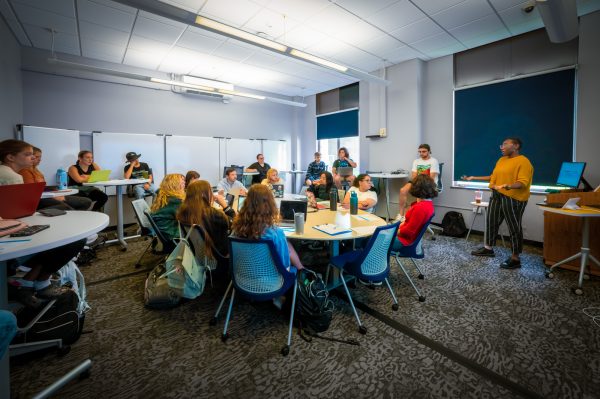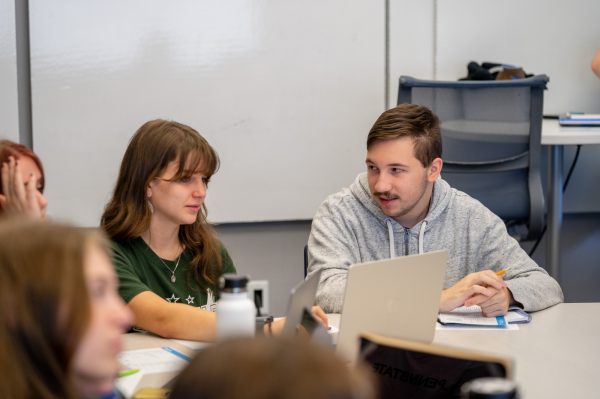A first-year seminar is a graduation requirement for all Penn State students. The seminars in the Liberal Arts are limited to twenty-four students and are offered in various Liberal Arts disciplines—English, psychology, history, philosophy, anthropology, political science, etc. The small size of the seminars allows for more discussion in class, interaction with the professor, and attention to writing skills. In addition to fulfilling the University’s first-year seminar requirement, each 3-credit seminar fulfills a General Education requirement in either the humanities or social and behavioral sciences.
First-year seminars allow students to learn more about the College of the Liberal Arts and Penn State. The seminars center around helping students become acclimated to the University, as well as begin to identify with the college, their peers, and their teachers. First-year engagement is an important component of every first-year seminar.


Liberal Arts first-year seminar objectives:
- Introduce students to:
- University study
- Their responsibilities as part of the University community
- Learning tools and resources available at Penn State
- Penn State as an academic community, including fields of study and areas of interest available to students
- Provide an opportunity for students to develop relationships with full-time faculty and other students in an academic area of interest to them.
Available First-Year Semesters
First-year seminars for the fall 2023 semester will be announced soon.
First-Year Seminar Substitution Process
Students in the College of the Liberal Arts who do not complete a first-year seminar in their first year at Penn State must meet with their academic adviser to propose a course substitute to fulfill the degree requirement.
Course Eligibility
- Must be successfully completed with a final grade
- Must be a small class (fewer than fifty students)
- Cannot be a large lecture with a small breakouts
Instructions
To have a course reviewed for substitution, you must meet with your academic adviser and detail how the course satisfies at least three of the active learning elements below.
- Active use of writing, speaking, and other forms of self-expression
- Opportunity for information gathering, synthesis, and analysis in solving problems
- Engagement in collaborative learning and teamwork
- Application of intercultural and international competence
- Dialogue pertaining to social behavior, community, and scholarly conduct
Available First-Year Seminars
AFAM 83 (M/W/F 2:30–3:20 p.m.)
First-Year Seminar in African American Studies
This course is usable toward the AFAM major/minor.
AFAM 83 has two primary purposes. First, it is designed to introduce students to college life and help them identify the resources and opportunities that will be most helpful to their future personal and professional path. Secondly, this seminar will introduce students to the interdisciplinary field of African American and Diaspora Studies. They will learn about major themes and topics in the field and meet faculty from various disciplines (History, English, Anthropology, Religion, Communication) who are researching those topics. Both aspects of the course will give students a clearer sense of the academic and personal opportunities available at Penn State and in African American Studies.
ASIA 83S.001 (T/Th 10:35–11:50 a.m.)
Asian Studies First Year Seminar
This course is usable toward the ASIA Studies major/minor.
Asian Studies First Year Seminar
The objective of this ASIA First-Year Seminar course is to provide the students with a broad perspective on the Chinese way of life in contemporary China. Through the course the students will have a chance to look at various domains of Chinese culture and society. The topics to be covered include salient characteristics of the Chinese language, prominent elements and practices inherent in Chinese culture and tradition, and essential aspects of China’s social structure, familial structure, religions, values and aspirations, belief system, arts and entertainment, governing system, economic system, education system, and communication system. The students will also gain a better understanding of the Chinese worldview as embedded within the Chinese language and Chinese way of life.
ASIA 83S.002 (M/W 11:15 a.m.–12:05 p.m.)
Asian Studies First Year Seminar
This course is usable toward the ASIA Studies major/minor.
Asian Studies First Year Seminar
This course provides an introduction to the meaning and advantages of a liberal arts education in the context of Asian Studies. Through reading, discussion, research, and writing, students in this course will develop many of the basic skills central to a liberal arts education. The specific topic will vary by instructor, but will address one or more countries of Asia. Materials may include works of fiction and literary criticism, historical documents and analysis, or other scholarship and primary materials related to the specific discipline of the instructor. Through reading, discussing, and further exploring such materials, students will build their skills of critical analysis, research, and argumentation, as well as enhancing their intercultural and international perspectives. The course fulfills the first-year seminar requirement as well as a general education or a Bachelor of Arts humanities requirement.
CAMS 83Y (M/W 2:30–3:45 p.m.)
First-Year Seminar in Classics and Ancient Mediterranean Studies
Jesus and his World
Although Jesus of Nazareth is the object of Christian devotion, he was not a Christian himself, but a pious Jew. What can be known about the historical figure of Jesus the Palestinian Jew? How would his teachings and actions have fit in the context of Judaism of his day, in the Greco-Roman world? What did he mean when he proclaimed the coming kingdom of God? This course will consider the early evidence for Jesus, including the canonical as well as non-canonical gospels. We will ask how much the historian is able to reconstruct of Jesus using historical method, what the limits of this investigation are, and how relevant the task is. We will consider and evaluate a few of the different scholarly reconstructions of the historical Jesus.
LHR 83S.002 (T/Th 1:35–2:50 p.m.)
First-Year Seminar in Labor and Human Resources
This course is usable toward the LHR major/minor.
Leadership Lessons from the Arts and Humanities
This course is for explorers. Rather than boring lectures, we delve deep into the meaning of life…and how it is enacted through leadership. Leadership is omnipresent in life. Arts and Humanities are the lifeblood of culture. Together, we will discuss, dissect and dissemble important works in the arts and humanities in the search for deeper meaning and insightful lessons that can be applied in everyday life. The format of the course is that of a salon-style conversation, where topics are introduced on particular themes (e.g., power; vision; conflict; perception), which we then explore, together, in deep discussions. A typical assignment to prepare a class session will consist of a reading selection of short stories from literature, viewing a film, reading professional articles from psychology and/or business, as well as viewing or listening to works of art. We will also incorporate “field trips” to visit museums, view architecture, and attend performances. This is a course for profound thinking—not for memorizing tidbits. You will come away from this course with useful knowledge to apply to everyday life, through the lens of leadership.
LHR 83S.003 (T/Th 3:05–4:20 p.m.)
First-Year Seminar in Labor and Human Resources
This course is usable toward the LHR major/minor.
Leadership Lessons from the Arts and Humanities
This course is for explorers. Rather than boring lectures, we delve deep into the meaning of life…and how it is enacted through leadership. Leadership is omnipresent in life. Arts and Humanities are the lifeblood of culture. Together, we will discuss, dissect and dissemble important works in the arts and humanities in the search for deeper meaning and insightful lessons that can be applied in everyday life. The format of the course is that of a salon-style conversation, where topics are introduced on particular themes (e.g., power; vision; conflict; perception), which we then explore, together, in deep discussions. A typical assignment to prepare a class session will consist of a reading selection of short stories from literature, viewing a film, reading professional articles from psychology and/or business, as well as viewing or listening to works of art. We will also incorporate “field trips” to visit museums, view architecture, and attend performances. This is a course for profound thinking—not for memorizing tidbits. You will come away from this course with useful knowledge to apply to everyday life, through the lens of leadership.
PHIL 83 (T/Th 3:05–4:20 p.m.)
First-Year Seminar in Philosophy
This course is usable toward the PHIL major/minor.
Philosophy of Nonviolence
Philosophical examination of nonviolence, including inner peace, nonviolent communication, nonviolent resistance, and antiwar pacifism, along with challenges from just war theory. Tolstoy, Gandhi, King, and Nhat Hanh are among the figures covered. While readings will draw from a variety of liberal arts disciplines, the course will serve as an introduction to philosophical methodology, with emphasis placed on the role of rational argumentation in justifying ethical positions. It will also include interactive community building activities and a culminating project where students design a nonviolent resistance campaign for social change.
PSYCH 83S (T/Th 4:35–5:50 p.m.)
First-Year Seminar in Psychology
This course is NOT usable toward the Psychology major/minor.
First-Year Seminar in Clinical Psychology
PSYCH 83S has two primary purposes. First, it is designed to introduce students to college life and help them identify the resources and opportunities that will be most helpful to their future personal and professional path. Secondly, this seminar will introduce students to the field of clinical psychology. They will learn about major themes and topics in the field and meet faculty and students from the psychology department. Both aspects of the course will give students a clearer sense of the academic and personal opportunities available at Penn State and in psychology.